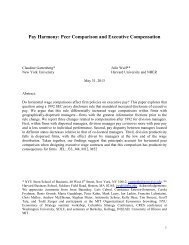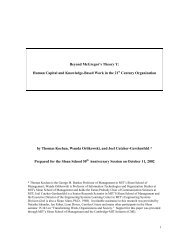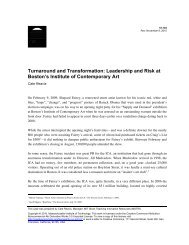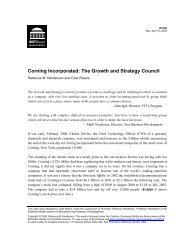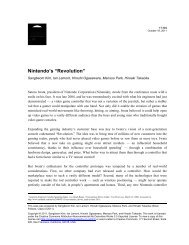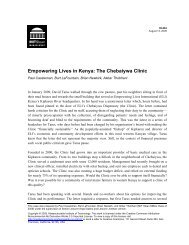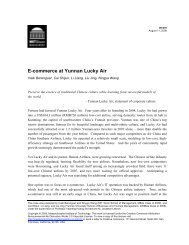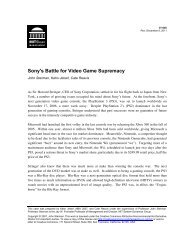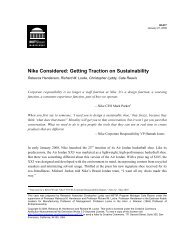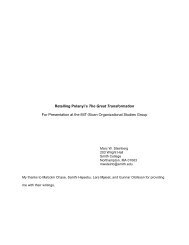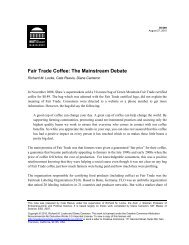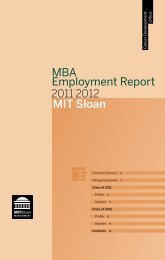Understanding earnings quality - MIT Sloan School of Management
Understanding earnings quality - MIT Sloan School of Management
Understanding earnings quality - MIT Sloan School of Management
You also want an ePaper? Increase the reach of your titles
YUMPU automatically turns print PDFs into web optimized ePapers that Google loves.
Street equity valuation model as <strong>earnings</strong> per share times a “coefficient <strong>of</strong> <strong>quality</strong>” where the <strong>quality</strong><br />
coefficient reflects firm-specific characteristics such as dividend policy, as well as “size, reputation,<br />
financial position and prospects,” the nature <strong>of</strong> the firm’s operations, and macro factors including<br />
“temper <strong>of</strong> the general market.”<br />
Accounting researchers continue to use the descriptor <strong>quality</strong> in reference to the<br />
decision-usefulness <strong>of</strong> <strong>earnings</strong> in equity market valuation, but use <strong>of</strong> the term has been<br />
extended to other contexts as well, likely because <strong>of</strong> our conversational understanding <strong>of</strong> the<br />
term <strong>quality</strong> as an indication <strong>of</strong> superiority or excellence. This evolution <strong>of</strong> a term such as<br />
<strong>earnings</strong> <strong>quality</strong> to its current state <strong>of</strong> ambiguity is not unique. Schelling (1978) describes the<br />
phenomenon:<br />
Each academic pr<strong>of</strong>ession can study the development <strong>of</strong> its own language. Some<br />
terms catch on and some don’t. A hastily chosen term that helps meet a need gets<br />
initiated into the language before anybody notices what an inappropriate term it is.<br />
People who recognize that a term is a poor one use it anyway in a hurry to save<br />
thinking <strong>of</strong> a better one, and in collective laziness we let inappropriate terminology<br />
into our language by default. Terms that once had accurate meanings become<br />
popular, become carelessly used, and cease to communicate with accuracy.<br />
Our approach in this review is to embrace the fact that <strong>earnings</strong> <strong>quality</strong> is a multi-faceted<br />
term. We therefore expand the scope <strong>of</strong> the review beyond studies <strong>of</strong> the decision-usefulness <strong>of</strong><br />
<strong>earnings</strong> in an equity valuation context. We identify the various proxies that have been used to<br />
measure <strong>earnings</strong> <strong>quality</strong>, evaluate the various attributes <strong>of</strong> decision usefulness (i.e., “<strong>quality</strong>”) that<br />
researchers have measured, and point out the strengths and weaknesses <strong>of</strong> each measure. We also<br />
identify circumstances where researchers obtain conflicting results because <strong>of</strong> ambiguity in what is<br />
meant by “<strong>quality</strong>” or differences due to the choice <strong>of</strong> <strong>earnings</strong> <strong>quality</strong> proxy. 2<br />
2 A number <strong>of</strong> survey papers <strong>of</strong> <strong>earnings</strong> <strong>quality</strong> and/or <strong>earnings</strong> management predate this review: Healy and Wahlen<br />
(1999); Dechow and Skinner (2000); McNichols (2000); Fields, Lys, and Vincent (2001); Imh<strong>of</strong>f (2003); Penman<br />
(2003); Nelson, Elliott, and Tarpley (2003); Schipper and Vincent (2003); Dechow and Schrand (2004); Francis, Olsson,<br />
2



